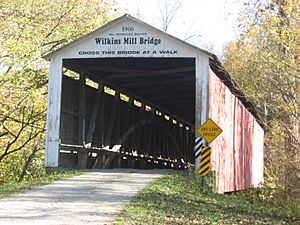Wilkins Mill Covered Bridge facts for kids
Quick facts for kids Wilkins Mill Covered Bridge |
|
|---|---|

Wilkins Mill Covered Bridge
|
|
| Coordinates | 39°53′54.09″N 87°13′59.37″W / 39.8983583°N 87.2331583°W |
| Carries | Cox Ford Road |
| Crosses | Sugar Mill Creek |
| Locale | Parke, Indiana, United States |
| Official name | Wilkins Mill Covered Bridge |
| Named for | Wilkins Mill |
| Maintained by | Parke County |
| NBI Number | 6100172 |
| Characteristics | |
| Design | National Register of Historic Places |
| Total length | 120 ft (37 m)102ft +9ft overhangs on each end |
| Width | 16 ft (4.9 m) |
| Height | 13 ft (4.0 m) |
| History | |
| Constructed by | Hendricks, William |
| Rebuilt | 1991 $6,000 |
| MPS | Parke County Covered Bridges TR |
| NRHP reference No. | 78000415 |
| Added to NRHP | Dec 22, 1978 |
| Lua error in Module:Location_map at line 420: attempt to index field 'wikibase' (a nil value). | |
The Wilkins Mill Covered Bridge is a historic wooden bridge located north of Rockville, Indiana. It's a special type of bridge called a covered bridge, which means it has a roof and sides. This helps protect the wooden structure from weather.
The bridge was built in 1906 by William Hendricks. It uses a design called a Burr Arch Truss. This design combines strong wooden arches with a truss system to make the bridge very sturdy. The Wilkins Mill Covered Bridge is about 120 feet (37 m) (36.6 m) long, 16 feet (4.9 m) (4.9 m) wide, and 13 feet (4.0 m) (4 m) high. In 1978, it was added to the National Register of Historic Places. This means it's recognized as an important historical site.
Bridge History: How it Got its Name
The area around the bridge has a long history with mills. In 1835, Solomon Jessup and Zimri Hunt built a mill upstream from where the bridge is now. Later, in 1853, George Wilkins opened a store nearby. He also had a mill for carding, which is a process to prepare wool.
- In 1855, George Wilkins bought the mill. He tore it down and built a new one. This is how the area got the name "Wilkins Mill."
- Sadly, this mill burned down in 1877. Another mill was built in its place, which stood until 1947.
The creek the bridge crosses was once called Mill Creek. Today, it's known as Sugar Mill Creek. At one point, after a flood, the creek changed its path. This left the bridge standing over a dry creek bed for a while! But if you look at satellite pictures now, it seems the bridge is crossing water again.
The Wilkins Mill Covered Bridge was the second of three covered bridges built by William Hendricks.
Gallery


